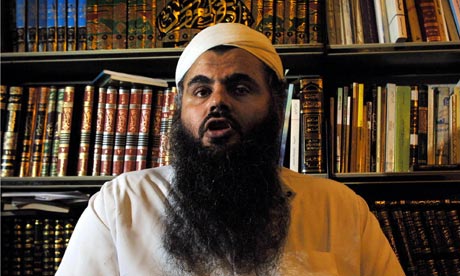
- News
- World news
- Abu Qatada
Abu Qatada row: Cameron pushes for deportation deal with Jordan
PM to kick-start negotiations over Qatada's deportation with King Abdullah of Jordan following European court's ruling
- guardian.co.uk, Wednesday 8 February 2012 14.27 GMT
- Article history

David Cameron has personally intervened in the Abu Qatada affair to accelerate efforts to find a diplomatic solution with the Jordanian authorities that would clear the way for the radical Islamist cleric to be deported.
The prime minister will try to kick-start talks over fresh diplomatic assurances by speaking to King Abdullah of Jordan on Wednesday. The Home Office minister, James Brokenshire, is to travel to Amman next week to press the issue further.
Tory and Labour MPs have roundly condemned this week's court ruling granting Abu Qatada bail, with some Conservatives demanding ministers simply send him home in defiance of a European court of human rights ruling blocking his deportation.
Mr Justice Mitting, the special immigration appeals commission (Siac) judge who decided that Abu Qatada should be released next week on highly restrictive bail terms including a 22-hour curfew, has warned that he will have to relax those conditions if no deal is struck with Jordan within the next three months.
Labour pressurised the home secretary, Theresa May, on Tuesday to get ministers directly involved in the discussions with the Jordanian government. The former home secretary Jack Straw reminded MPs that he had tried to negotiate with the Jordanians, but with no success.
Ministers need to secure a court-proof diplomatic assurance to overcome the Strasbourg court's objections that Abu Qatada could face a retrial for terrorism offences based on evidence that had been obtained by torture if he is sent back to Amman.
The UK-Jordan memorandum of understanding on national security deportations is one of the strongest "no torture, no ill-treatment" deals that has been struck but it does not cover the issue at the heart of the Abu Qatada case – the use of evidence extracted by torture to convict him in absentia. British ministers are said to recognise the difficulties involved in getting any state to acknowledge in writing that witnesses in a court case have been tortured.
The British ambassador to Jordan met officials twice last week in an attempt to get negotiations started but Mitting said on Monday that negotiations were only at the earliest stages.
Anthony Layden, a former British ambassador to Libya who has been conducting negotiations on behalf the home secretary, has been involved in a series of attempts, some successful, to strike diplomatic "no torture, no ill-treatment" deals with several north African countries to send back terror suspects on national security grounds.
The Siac judge said on Monday that the chances of being able to deport Abu Qatada were slimmer after the Strasbourg ruling "but they are not negligible".
He outlined the problem in his ruling, saying he couldn't predict how long talks would take nor what their outcome might be: "All I can do is to observe that the position of the appellant [Abu Qatada] would present very great problems for the Jordanian authorities if he were to be returned there and if he could not be retried for offences which could result in a lengthy term of imprisonment, if he were to be convicted."
But Mitting added that the Strasbourg court was right to say that any solemn assurances given by Jordan could be safely accepted by British ministers given the "very long history of good relations" between both countries.
Abu Qatada's lawyers have played down the significance of the renewed diplomatic attempt, saying it was not even known if the British government was pressing for a pardon for the radical cleric.
The Strasbourg ruling makes clear that the "torture-tainted evidence" from a co-defendant was "of considerable, perhaps decisive, importance" to Abu Qatada's conviction in his absence and that, if returned, any retrial would amount to a "flagrant denial of justice" were he to be returned.
The court found that the use of torture and evidence obtained by torture was widespread in the Jordanian courts. The authorities had taken no action when Abu Qatada's two co-defendants complained about torture when they stood trial.

No comments:
Post a Comment